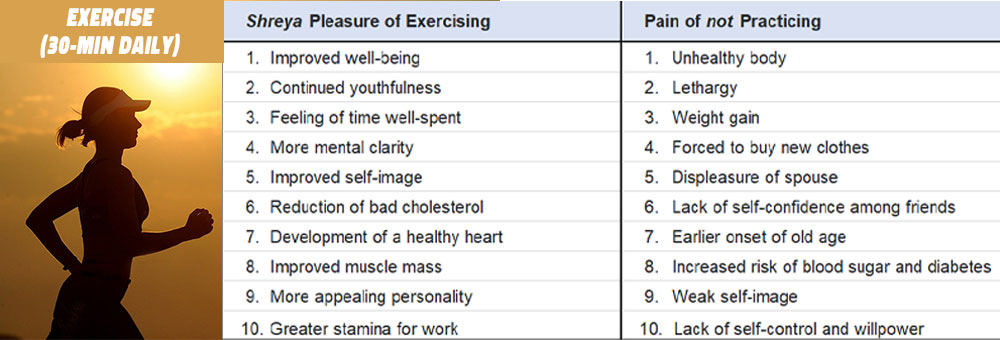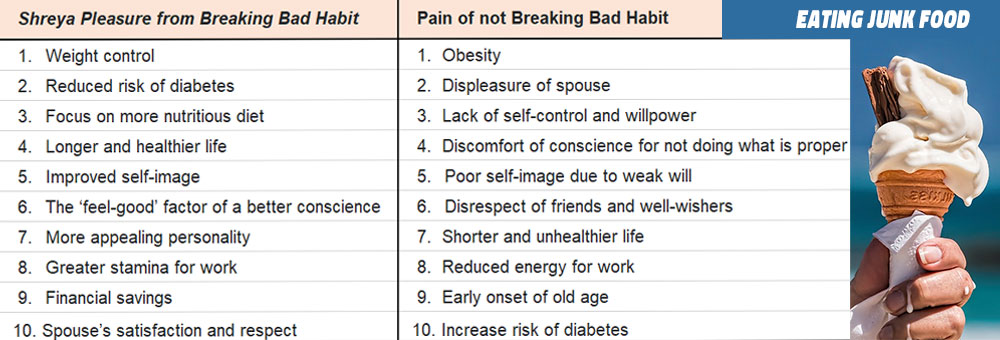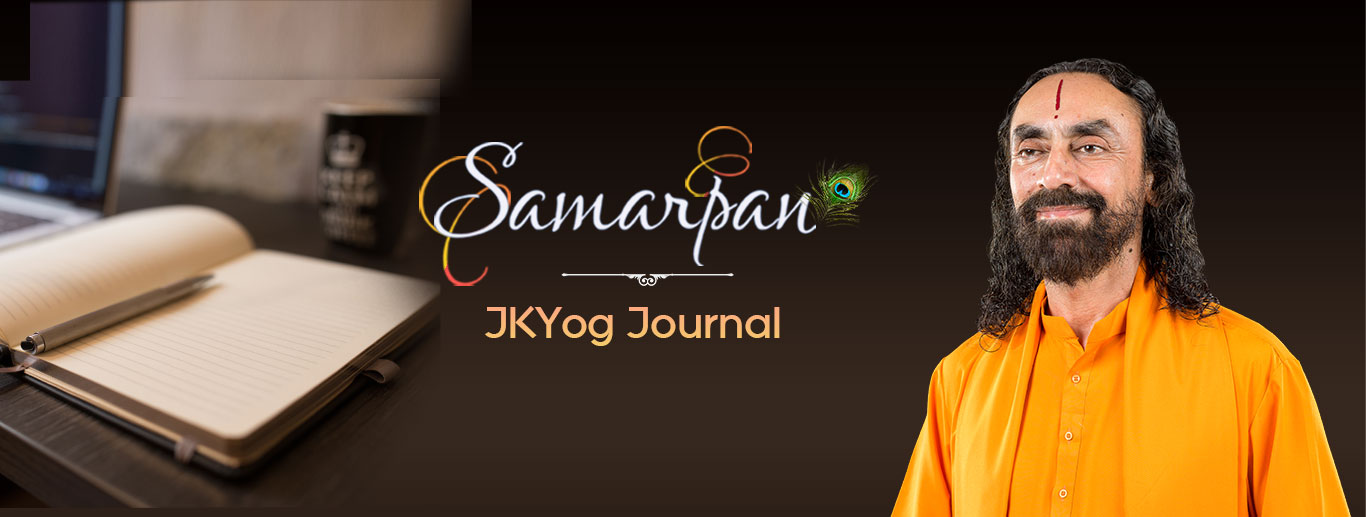
From the Editor’s Desk
Welcome to the second issue of Samarpan! This month we focus on a theme that is essential for a healthy body and mind - Creating Healthy Eating Habits. Even though many of us are conscientious about following a healthy lifestyle, there are times in life when healthy habits fall apart. So, this month we tackle the challenge of changing unhealthy eating habits with some Vedic wisdom and practical tools for application. We invite you to share your inspirational stories that highlight how you developed healthy eating habits or made lifestyle changes for good overall health of the body, mind and soul.

Vedic Wisdom & Application
Challenge of the Month
Creating Healthy Eating Habits
Reflection Questions
- Why do we love unhealthy food?
- When do we eat unhealthy food?
- How can we increase healthy habits?
Unhealthy eating can be described as eating whatever edible items we crave for that immediately satisfy the palate, even if harmful in the long run. When we eat foods to satisfy the palate, invariably we end up eating the wrong foods that contain high amounts of salt, sugar, excessive spices and harmful fat. Such foods temporarily satiate our inner cravings. The “feel good” factor is a very powerful reinforcer that turns seemingly innocuous actions into an irreversible bad habit. Let us look at some of the reasons why we eat unhealthy food.
In his recently published book on The Science of Mind Management, Swamiji said that unhealthy eating is like a bad habit that we cannot give up because we do not observe any immediate harmful effect. On the other hand, we may experience emotional gratification or sensory pleasure when eating the wrong foods. Gradually, without our conscious awareness, we become conditioned to seek immediate pleasure and begin eating wrong foods at the wrong time as well. We get caught into a bad habit loop!
In his lectures, Swamiji has described the importance of understanding the bio-cycle to make better decisions about when and how much food to consume. He says that we should “earn our breakfast” after exercising in the morning. Lunch should be the heaviest meal and consumed between noon and 1:00 PM. We should have a light dinner 3-4 hours before bedtime to allow the body adequate time to digest the food. Also, we should drink water either ½ hour before or 2 hours after meals but not during the meal. These habits are in sync with our metabolic system and position of the sun.
Swamiji also says that what we eat impacts the physical body and the mind. We are what we eat! Our scriptures also teach us a lot about foods that we eat. In Chapter 17 of the Bhagavad Gita, Swamiji explains that our preference for food is in accordance with our gunas (i.e., modes of goodness or sattva, passion or rajas, and ignorance or tamas). If we eat pure food, our mind will become pure too. Specifically, Bhagavad Gita 17.8 states:
आयु:सत्त्वबलारोग्यसुखप्रीतिविवर्धना: |
रस्या: स्निग्धा: स्थिरा हृद्या आहारा: सात्त्विकप्रिया: || 8||
āyuḥ-sattva-balārogya-sukha-prīti-vivardhanāḥ
rasyāḥ snigdhāḥ sthirā hṛidyā āhārāḥ sāttvika-priyāḥ
“Persons in the mode of goodness prefer foods that promote the life span, and increase virtue, strength, health, happiness, and satisfaction. Such foods are juicy, succulent, nourishing, and naturally tasteful.” Such foods are also conducive to good physical and mental health. The Bhagavad Gita (17.9) also states that:
कट्वम्ललवणात्युष्णतीक्ष्णरूक्षविदाहिन: |
आहारा राजसस्येष्टा दु:खशोकामयप्रदा: || 9||
kaṭv-amla-lavaṇāty-uṣhṇa- tīkṣhṇa-rūkṣha-vidāhinaḥ
āhārā rājasasyeṣhṭā duḥkha-śhokāmaya-pradāḥ
“Foods that are too bitter, too sour, salty, very hot, pungent, dry, and chiliful, are dear to persons in the mode of passion. Such foods produce pain, grief, and disease.”Swamiji further explains that such foods are eaten in the tamasic mode with the purpose of experiencing material bliss through the palate (i.e., preya pleasure – referenced in the October issue of Samarpan). Thus, people tend to eat at any time of the day when they want immediate gratification of the senses, even if they are not hungry.
With this knowledge about our gunas and corresponding food preferences, we need to reflect on ways we can increase healthy habits and a sustainable lifestyle.
In The Science of Mind Management, in the chapter on The Power of Habits, Swamiji presents a very strong case for contemplating on the pleasure vs. pain of adopting a healthy vs. unhealthy lifestyle with respect to food and exercise. Quoted directly from the book (pp. 75-77), here are the essential points to reflect on in one’s daily life.



Tools for Your Personal Growth
Armed with this critical knowledge from our scriptures and Swamiji’s teachings, let us convert unhealthy eating and lifestyle habits into healthier habits for shreya pleasure.
Here is a weekly checklist of food consumption and exercise routine drawn from Swamiji’s book on Science of Healthy Diet.

A blank downloadable weekly checklist of food consumption and exercise routine is available for your use.

Love to Hear from You
- How did you apply the Vedic Wisdom?
- What challenges did you experience in the process? Please share below.
Please share your comments under “Join the Discussion” below.

Gems of Wisdom from Swamiji
Here are some YouTube video titles where Swamiji describes the importance of the impact of the type of food on our body and mind. His book is also referenced.
- Mukundananda, S. (2020). The Science of Mind Management, Westland Publications: Chennai, India.
- Mukundananda, S. (2017). Science of Healthy Diet, Jagadguru Kripaluji Yog: New Delhi, India.



Hold Your Breath! Check out Upcoming Events
We are very excited to announce two dynamite events this month!

Mind Management Challenge - Put to Practice Session
The Mind Management Challenge’s Put-to-Practice session was inaugurated on Monday, November 2, 2020 in the auspicious presence of Swamiji, and will be held from 8:00 to 9:00 pm CDT every day. It is designed to take participants to the next step in learning mind management.
We just completed the Mind Management 21-Day Challenge, comprising 21 dynamite videos where Swamiji described the essential concepts and tools to control the wayward mind. These videos have been extremely beneficial to move forward on the spiritual path. The Put-to-Practice sessions will help to apply the knowledge through interactive activities, simple exercises to review key concepts, discussions with like-minded spiritual aspirants, and Q/A with session moderators. Participants will have the opportunity to experience inner transformation. Check out this video by JKYog Academy where many participants of previous programs describe how they benefitted from active engagement.

JKYog Diwali Mahotsav - Save the Dates
Everyone is always so excited about celebrating Diwali. It reminds us of the end of an era of ignorance and wrongdoing, and marks the beginning of the era of knowledge and virtue. When Lord Ram killed Ravan and returned to Ayodhya, each devotee experienced the divine bliss of engaging with Him at an individual level, just like the Gopis during Maharaas. Let us gain strength from these sentiments as we celebrate Diwali virtually this year. Let us look for all the wonderful opportunities for internal growth that we have all received due to the current restrictive conditions.
JKYog and the Radha Krishna Temple will hold a 4-day Diwali Mahotsav from November 12-15, 2020. We will have special poojas and related events during the day and in the evebing. These include Dhan Teras (Laxmi Pooja), Kali Chaudas (Hanuman Chalisa), Diwali (Sharda Poojan, Chopada Poojan, Sundarkand, Ram Poojan, and Soulful Bhajans), and New Year (Goverdhan Pooja, Annakoot, and Soulful Bhajans). Please click here for details.
Many seva opportunities will be available, from sponsorship of individual poojas to various categories of yajmans.

Voices from the Global Community
We would like to share ways in which a member of our global community has been impacted by the scriptural knowledge as taught and disseminated by Swamiji.
This month, we feature Anu Huang who lives in Detroit, MI. She is an IT Integration Manager at one of the Big3automotive manufacturers. Anu was first introduced to JKYog through online yoga classes.Subsequently, she was drawn to spirituality through JKYog’sonline classeslike Daily Sadhana, Bhagavad Gita, Happiness Challenge, Patanjali Yog Sutra, etc. These inspired her to complete JKYog’s first ever 200-hour Yoga Teacher Training course. Please watch the video where she describes how she benefitted from JKYog’s programs.
We invite you to share your inspirations and success stories with us at samarpanteam1119@gmail.com.

JKYog Transforming Communities
This month we feature JKYog’s amazing Prem Yoga Teacher Training (PYTT) program.
JKYog recently launched the Prem Yoga Academy and held its first 200-hour yoga training course (PYTT). Nearly 60 participants from around the U.S. and the world graduated. The PYTT equipped participants with the ability to know, teach and practice yoga poses and breathing techniques. They also gained access to the deeper dimensions of yoga, integrated asanas with spiritual practice, and discovered the tools to master their life.
Through Prem Yoga's holistic curriculum and expert teachers, and under Swamiji’s guidance, participants also experienced a powerful transforming shift which will shape their lives for a long time. The graduates continue their practice, deepen the foundation of their knowledge, and serve as sources of inspiration for others in their communities and around the world!
We invite you to review some of their testimonials.
Additionally, Prem Yoga also has a YouTube channel where you will find yoga and meditation videos for the benefit of the global community.









